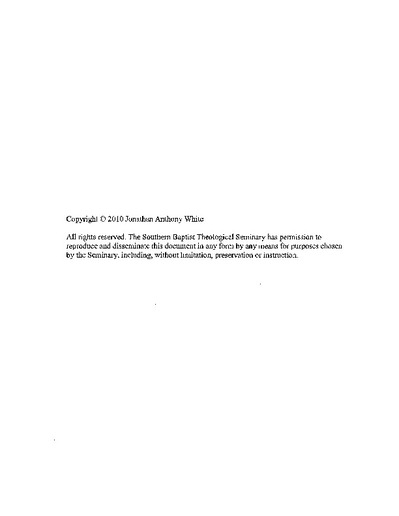| dc.description.abstract | This dissertation is a theological and historical examination of John Gill's
soteriology that argues against classifying him as a Hyper-Calvinist. Gill's complex
theology, as well as the difficulty of defining Hyper-Calvinism, argues against labeling
Gill as such. Chapter 1 is a survey of historical evaluations of Gill concerning his
relationship to Hyper-Calvinism. Evidence is presented showing that many of the
evaluations are suspect due to a historiographically-biased paradigm.
Chapter 2 surveys numerous approaches to defining Hyper-Calvinism. This
displays the incredible lack of agreement on a definition and therefore is problematic
concerning labeling Gill as a Hyper-Calvinist. A working definition is suggested, based
on an evaluation of the Modem Question controversy.
Chapter 3 examines eternal aspects of Gill's soteriology. It is argued that while
foundational to Gill's soteriology, these aspects are not the totality of his soteriologyand
thus he remains within the confines of historic Calvinism.
Chapter 4 examines God-ward aspects of Gill's soteriology. His view of the
love and grace of God is presented, especially concerning the discriminating aspects
between the elect and non-elect.
Chapter 5 examines the anthropological aspects of Gill's soteriology,
specifically dealing with man's responsibility. The complex nature of this aspect shows
the difficulty of the issue. On this point Gill does show some affinity with Hyper-Calvinism.
However, his nuanced position cautions against a simple categorization of his
position as Hyper-Calvinism.
Chapter 6 examines the legal aspects of Gill's soteriology, specifically the
issue of Antinomianism. Gill is easily defended against the charge of either doctrinal or
practical Antinomianism.
Chapter 7 deals with evangelistic aspects of Gill's soteriology, specifically his
view concerning the offer of the gospel. Careful examination of this aspect shows that
while Gill rejected the idea of "offering" the gospel, he accepted the idea of preaching the
gospel to all.
Chapter 8 deals with practical aspects of Gill's soteriology. Issues of Gill's
view of evangelism and missions, as well as his relationship to the perceived decline of
Particular Baptists in eighteenth century England are examined. Chapter 9 sets forth some
proposals resulting from the study. | en_US |

